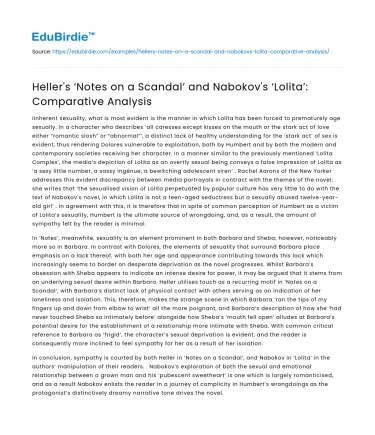Iinherent sexuality, what is most evident is the manner in which Lolita has been forced to prematurely age sexually. In a character who describes ‘all caresses except kisses on the mouth or the stark act of love either “romantic slosh” or “abnormal”’, a distinct lack of healthy understanding for the ‘stark act’ of sex is evident, thus rendering Dolores vulnerable to exploitation, both by Humbert and by both the modern and contemporary societies receiving her character. In a manner similar to the previously mentioned ‘Lolita Complex’, the media’s depiction of Lolita as an overtly sexual being conveys a false impression of Lolita as ‘a sexy little number, a sassy ingénue, a bewitching adolescent siren’ . Rachel Aarons of the New Yorker addresses this evident discrepancy between media portrayals in contract with the themes of the novel; she writes that ‘the sexualised vision of Lolita perpetuated by popular culture has very little to do with the text of Nabokov’s novel, in which Lolita is not a teen-aged seductress but a sexually abused twelve-year-old girl’ . In agreement with this, it is therefore that in spite of common perception of Humbert as a victim of Lolita’s sexuality, Humbert is the ultimate source of wrongdoing, and, as a result, the amount of sympathy felt by the reader is minimal.
In ‘Notes’, meanwhile, sexuality is an element prominent in both Barbara and Sheba; however, noticeably more so in Barbara. In contrast with Dolores, the elements of sexuality that surround Barbara place emphasis on a lack thereof, with both her age and appearance contributing towards this lack which increasingly seems to border on desperate deprivation as the novel progresses. Whilst Barbara’s obsession with Sheba appears to indicate an intense desire for power, it may be argued that it stems from an underlying sexual desire within Barbara. Heller utilises touch as a recurring motif in ‘Notes on a Scandal’, with Barbara’s distinct lack of physical contact with others serving as an indication of her loneliness and isolation. This, therefore, makes the strange scene in which Barbara ‘ran the tips of my fingers up and down from elbow to wrist’ all the more poignant, and Barbara’s description of how she ‘had never touched Sheba so intimately before’ alongside how Sheba’s ‘mouth fell open’ alludes at Barbara’s potential desire for the establishment of a relationship more intimate with Sheba. With common critical reference to Barbara as ‘frigid’, the character’s sexual deprivation is evident, and the reader is consequently more inclined to feel sympathy for her as a result of her isolation.
Save your time!
We can take care of your essay
- Proper editing and formatting
- Free revision, title page, and bibliography
- Flexible prices and money-back guarantee
In conclusion, sympathy is courted by both Heller in ‘Notes on a Scandal’, and Nabokov in ‘Lolita’ in the authors’ manipulation of their readers. . Nabokov’s exploration of both the sexual and emotional relationship between a grown man and his ‘pubescent sweetheart’ is one which is largely romanticised, and as a result Nabokov enlists the reader in a journey of complicity in Humbert’s wrongdoings as the protagonist’s distinctively dreamy narrative tone drives the novel. However, in spite of Humbert Humbert’s attempted manipulation of the reader, the character’s desire for sex is the ultimate driving force of his despicable actions. It is therefore that, although his evil is often masked, feelings of sympathy for Humbert Humbert are minimal, particularly when compared to Heller’s Sheba Hart in ‘Notes on a Scandal’. Whilst Sheba’s relationship with schoolboy Steven Connolly is undoubtedly predatory in nature, there is an inclination in the reader to sympathise with her character as a consequence of the loneliness within her marriage and the lack of contentment that drives her. Furthermore, the predator-prey relationship established between Humbert and Lolita is almost reflected in the relationship shared between Barbara and Sheba. Sheba’s position within the relationship is evidently that of a victim, and as the novel progresses the reader is inclined to feel more sympathy for her as a result.






 Stuck on your essay?
Stuck on your essay?

